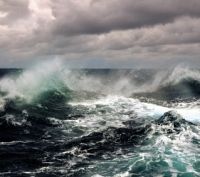

A World Wildlife Fund (WWF) report has predicted that the number of winter storms in the UK could rise by up to 25% over a 30 year period, if carbon dioxide emissions are not reduced. As a result, Northern Ireland could face one of the worst storm threats in Europe, with low-lying coastal areas such as the Ards Peninsula, Belfast Lough and the Foyle Estuary the most affected. The "Stormy Europe" report goes on to suggest that climate change could mean 10 extra storms between 2071 and 2100, with wind speeds rising between 8-16%. Malachy Campbell of WWF Northern Ireland pointed out that while there may be some uncertainties over the report, it represents scientific evidence of the reality that climate change has potentially serious consequences for us, and that there is a "reluctance on the part of our Government to really tackle the problem and the potential impacts".
The Northern Ireland Government has so far failed to produce any long term vision on how to reduce emissions and move away from being a fossil fuel reliant economy to one which maximises sustainable renewable energy potential.